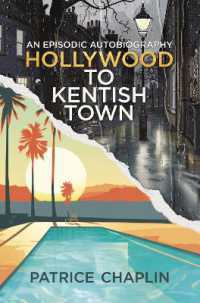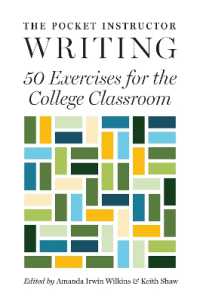Full Description
Drawing on--but also extending--the theories and methods of applied linguistics, this book demonstrates how scholars of language might work together and with non-language specialists to address pressing concerns and issues of our time. Chapters explore efforts to recognize the legitimacy of stigmatized language varieties in public and institutional domains, museum-based science education for linguistically diverse children, how corpus analysis might illuminate the tension between the language choices and commitments of certain leaders, the embodied and artistic forms of meaning-making that challenge norms of Whiteness, and the transformative power of translanguaging in community-based theater.
In addition, the volume demonstrates ways to enhance equity in healthcare delivery for immigrant families, examines the experiences of cultural health navigators working with refugee-background families, and highlights the value of raising public awareness of language issues related to social justice. These accounts show that applied linguists stand ready to interface with other scholars, other institutions, and the public to make socially-engaged and impactful contributions to the study of language, society, education, and access. Collectively, the authors respond to an important gap in the field and take a significant step towards a more socially-just, accessible, and inclusive approach to applied linguistics.
Contents
Introduction, Doris S. Warriner (Arizona State University, USA) and Elizabeth Miller (University of North Carolina at Charlotte, USA)
1. Engaging the Public in Sociolinguistics for Social Justice: Advocating for Pidgin Speakers in Hawai'i, Christina Higgins (University of Hawai'i-Manoa, USA)
2. Building Partnerships and Expanding Repertoires of Practice: Working with and in Museums to Improve Informal Science Education for Linguistically Diverse Young Children, Leslie C. Moore (Ohio State University, USA)
3. An Applied Linguist at Work: Tracing Language Choices in a Social Sustainability Network, Elizabeth Miller (University of North Carolina at Charlotte, USA)
4. Finding Answers within the Story: The Transformative Potential of Translanguaging Praxis, Obed Arango and Holly Link (University of Pennsylvania, USA)
5. Being, Seeing and Hearing White: When Theater-Arts Interrogate and Make Visible the Power of the Elephant in the Room, Ellen Skilton (Arcadia University, USA)
6. Language as a Social Determinant of Health: Partnerships for Health Equity, Emily M. Feuerherm (University of Michigan, USA), Rachel E. Showstack (Wichita State University, USA), Maricel G. Santos (San Francisco State University, USA), Glenn A. Martinez (The Ohio State University, USA), and Holly E. Jacobson (University of New Mexico, USA)
7. "It Depends Case by Case": Understanding How the Practices of Cultural Health Navigators Impact Health Care Access and Delivery for Refugee-Background Families, Katherine E. Morelli (Northeastern University, USA) and Doris S. Warriner (Arizona State University, USA)
8. Applied Linguistic Anthropology: Balancing Social Science with Social Change, Netta Avineri (Middlebury Institute of International Studies at Monterey, USA), Eric J. Johnson (Washington State University, USA), Bernard C. Perley (University of British Columbia, Canada), Jonathan Rosa (Stanford Graduate School of Education, USA) and Ana Celia Zentella (University of California San Diego, USA)
Afterword: Crossing Borders, Rethinking Expertise, and Becoming Collaborative Linguists, Betsy Rymes (University of Pennsylvania, USA)
Index






